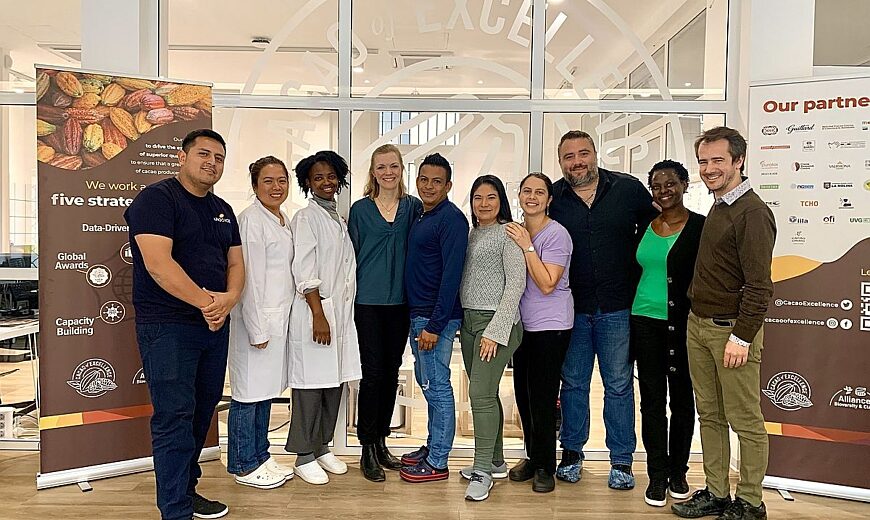Contact the communications team
E-Mail: press@fairtrade.net
5 Mar 2024

Rome, Italy -- The Cacao of Excellence Programme, in partnership with Fairtrade International and the Latin American and Caribbean Network of Fair Trade Small Producers and Workers (CLAC), is pleased to announce the successful completion of a scientific visit and training session aimed at enhancing the cocoa quality and market positioning of Ecuadorian Fairtrade cocoa cooperatives.
The 10-day training, held from 19 February to 1 March 2024, at the Cacao of Excellence R&D Laboratory and Training Centre in Rome, Italy, saw the participation of key members from three prominent cooperatives: Fortaleza del Valle, UOPROCAE, and UNOCACE, and a representative of CLAC.
The training focused on pioneering practices to evaluate cocoa quality, emphasising the use of internationally agreed upon protocols for cocoa processing and a common language for the assessment of cocoa quality and flavour, based on the Cacao of Excellence Guide for the Assessment of Cacao Quality and Flavour. The training was led by food technologist and consultant, Dolores Alvarado.
Among the expert trainees were Patricio Andres Zambrano Giler, Technical Advisor for Cacao Quality of the Fortaleza del Valle Cooperative. Fortaleza del Valle, a member of Ecuador’s Corporation of Fine Flavour Cocoa National Producers Associations (CONCACAO), is renowned for its commitment to excellence and comprises five cooperatives in the Carrizal Chone region. With over 980 farmer families involved, Fortaleza del Valle has been Fairtrade certified since 2005, ensuring sustainable practices and enabling fairer prices.
Luis Javier Meza Cabrera, Quality Cacao Technical Specialist of UOPROCAE, also participated in the training. Established in March 2012, Ecuador’s UOPROCAE brings together five organisations of small cocoa producers in the province of Esmeraldas, comprising a total of 450 families. UOPROCAE is dedicated to fostering quality and sustainability within its member organisations and contributing to the development of the local cocoa industry.
Lady Johanna Paredes Avila, Head of the Quality Department, and Juan Carlos Garcia Arechua, President, of Ecuador’s UNOCACE Cooperative, were also participants in the training. Founded in 1999, UNOCACE is composed of 20 associations that bring together 1,900 smallholder cocoa producers. UNOCACE has been instrumental in driving innovation and quality improvement initiatives within the Ecuadorian cocoa sector.
Raúl Fernando Farías Bohórquez, Commercial Logistics Manager of CLAC also participated in the training. The CLAC-Fairtrade network represents all Fairtrade certified organisations in Latin America and the Caribbean: close to 1,000 producer organisations in 24 countries.
All of the participants received hands-on training that mirror the processes typically carried out in laboratories for international competitions. This included physically evaluating and cleaning beans, as well as roasting and winnowing nibs, progressing to grinding cocoa mass and tempering chocolate for sensory assessment of the cocoa beans. Participants enhanced their ability to process cocoa samples for sensory evaluation using standardised methodologies.
"The expert participants displayed a keen interest and dedication on behalf of their cooperatives to elevate the quality and value of Ecuadorian cacao," said Alvarado, the Lead Trainer.
“Through this training, we aim to empower cooperatives to unlock their full potential and strengthen their position in the international market,” added Julien Simonis, Programme Manager, Cacao of Excellence.
Their time in the laboratory provided a unique opportunity for participants to encounter the diversity of cocoa beans simultaneously and in one location. This was especially beneficial for experts from cocoa-producing countries where accessing beans from other regions is challenging. Throughout the training, participants discovered how cocoa diversity manifests not only in flavour and physical attributes but also in the behavior of beans at each processing stage.
“The partnership between Cacao of Excellence and Fairtrade underscores the importance of collaboration in driving excellence for fairer incomes,” said Johanna Schmidt, Fairtrade International’s Cocoa Manager. “Together, we are committed to supporting producers so that they can better understand the value of their cocoa offer and market it to the right buyers. We look forward to further collaboration for the benefit of smallholder farmers,” she added.
Following the training, Cacao of Excellence and Fairtrade International will continue to collaborate to ensure participants benefit from subsequent activities that further bolster Ecuadorian cooperatives' pursuit of enhanced quality standards and improved market access.
The training is part of the partnership between Cacao of Excellence and Fairtrade International, launched in 2022. Through the partnership, Fairtrade and Cacao of Excellence work together to build capacity in origins by providing farmers with support to analyse and improve the quality of their cocoa production to properly market and gain access to buyers seeking superior quality cocoa. Trainings and future collaborative initiatives aim to boost farmer incomes and strengthen the sector’s sustainability.
Cacao of Excellence opts for the term 'cacao' over 'cocoa' to better resonate with the origins of the revered bean, diverging from the English rendition of the term.
E-Mail: press@fairtrade.net